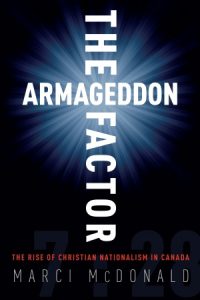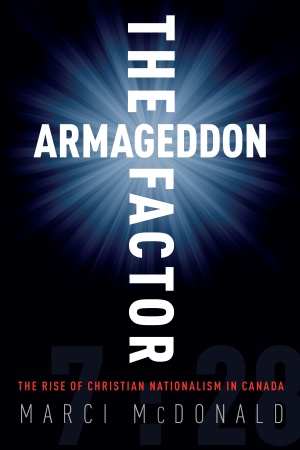by Paul Esau (Contributor)
Email: cascade.news [at] ufv [dot] ca
 On November 1st, Marci McDonald visited UFV to provide a commentary on her new book, The Armageddon Factor: The Rise of Christian Nationalism in Canada.
On November 1st, Marci McDonald visited UFV to provide a commentary on her new book, The Armageddon Factor: The Rise of Christian Nationalism in Canada.
Since its publication earlier in the year, this book has been making waves across the nation with its assertion that “slowly, covertly, the political process [in Canada] is being co-opted by an extremist vision of Christianity – one ultimately shaped by what I call ‘the Armageddon factor.’”
McDonald’s commentary both clarified and defended this warning, and was given to a packed auditorium obviously divided on the issue – according to UFV professor Ron Dart, the number of attendees was around 230.
Perhaps because of the conservative reputation of the Fraser Valley, McDonald opted to begin with a disclaimer. She described herself as “a Christian, albeit a highly flawed one,” and explained that the purpose of her book is “to chronicle the emerging religious right” and is “not an attack on faith.”
The term ‘Christian,’ she asserts, has been hijacked by a certain section of the religious right for its own radical agenda, and it is this relative minority that her book is about.
It may be surprising to some that a book on Christian nationalism would focus on Canada as opposed to our southern neighbour, but McDonald is adamant that a religious force exists in Ottawa and that its power is growing.
She cited two major events as initiating the formation and organization of the religious right in Canada: the election of Stephen Harper to leadership of the Alliance party in 2002, and the same-sex marriage debate in Ontario the following year.
The 2002 party election pitted Harper against Stockwell Day, a committed Pentecostal who, McDonald alleges, used his church background to gain the religious vote. Even though Day lost the election, he brought to the party a significant religious minority that Harper was subsequently forced to cater to. Whereas the long-standing issue of same-sex marriage created a motive for Christian nationalists to enter the political scene, Harper’s party gave them a means to do so.
The same-sex marriage debate in Ontario in the following year provided a use for that influence and illustrated the need to Christian activists for political mobilization against an obvious threat to traditional Christian theology, according to McDonald.
McDonald’s lecture catalogued significant religious-political groups that appeared on the ensuing scene. These include Canadian “proxies” of previously established American groups (for example, Charles Dobson’s “Focus on the Family” network), and religious organizations in Ottawa, such as Preston Manning’s ambiguously titled “Centre for Building Democracy.” These religious groups, McDonald asserts, are working for a ‘Christian’ Canada, built on Biblical principles, instead of secular ones.
In the end, McDonald argues that, while there is nothing unconstitutional about political interest groups, it is “up to voters to decide how much religion they want, and [that decision] must be based upon informed, rational debate.” Her purpose is only to inform the electorate so that they are aware of the threat of Christian nationalism, and can respond accordingly.
A rebuttal to the book was then given by Mennonite scholar John Redekop. He lauded the book as a journalistic effort but claimed to be troubled by a perceived disconnect between its material and what he recognized as its thesis.
He observed that, although the title and much of the preface discusses “a militant charismatic fringe… helping to reshape foreign policy [and attempting the] remaking of Canada as a distinctly Christian nation,” most of the powerful organizations covered in later chapters are unrelated to this “fringe.”
My “one general criticism,” Redekop stated, is that “the writing doesn’t make the case that this is a threat.” In a written response, he further argues that the book implies “that in Canada, there is a largely integrated, more or less cohesive, political Far Right Movement. In fact, as the author’s research shows, there is no such movement. It is fragmented, working from a series of vastly differing mindsets and motivations… there is no integrating or common Armageddon Factor.”


